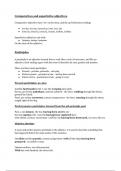Comparatives and superlative adjectives
Comparative adjectives have ‘ior’ on the stem, and the 3rd declension endings
● ior/ius, ior/ius, iorem/ius, ioris, iori, iori
● iores/ia, iores/ia, iores/ia, iorium, ioribus, ioribus
Superlative adjectives end with:
● Issimus, issima, issimum
On the stem of the adjective.
Participles
A participle is an adjective formed from a verb, like a verb, it has tenses, and like an
adjective, their endings agree with the noun it describes by case, gender and number.
There are three main participles:
● Present - portans, portantis - carrying
● Perfect passive - portatus/a/um - having been carried
● Future active - portaturus/a/um - going to carry
Present participles: ns, ntes
Ancillas lacrimantes vidi- I saw the weeping slave girls.
Servus, per forum ambulans, amicum salutavit - the slave, walking through the forum,
greeted the friend.
Pueri, per urbem currentes, canem conspexerunt - the boys, running through the street,
caught sight of the dog.
Perfect passive participles: formed from the 4th principle part
Puer, a me missus- the boy, having been sent by me
Servum captum vidi- i saw the having been captured slave
Urbe deleta, ad mare cucurrimus- with the city having been destroyed, we ran to the sea
Ablative absolute
A noun and perfect passive participle in the ablative- it is used to describe something that
has happened before the main action of the sentence.
Omnibus navibus paratis, roman navigavimus- with all the ships having been
prepared, we sailed to rome
Labore confecto, servi discesserunt
With the work finished, the slaves left.
, Future active participles: formed from perfect passive + ur
Portaturus- about to carry
Capturi- about to capture
Auditurae- about to hear
Pueri discessuri clamorem audiverunt- the boys, about to leave, heard a noise.
Senex pecuniam celaturus erat- the old man was going to hide the money.
Roman iturus semper laetus sum- i am always happy when im about to go to Rome.
Donum tibi daturus sum- i am going to give gifts to you.
Deponent verbs
Deponent verbs are passive in from, yet they are translated with an active meaning,
Many common deponent verbs are:
Videor, videri, visus sum- i seem
Loquor, loqui, locutus sum- i speak
Progredior, progredi, progressus sum- i advance
Hortor, bortari, hortatus sum- i encourage
Miror, mirari, miratus sum- i admire
Morior, mori, mortuus sum- i die
Sequor, sequi, secutus sum- i follow
Proficiscor, proficisi, profectus sum- i set out
Perfect active participles
Because deponent verbs have no passive form, they do not have a perfect passive participle.
However, they fo have a perfect active participle which acts looks passive.
Senator, haec verba locutus, discessit - the senator, having spoken these words, left.
Milites, ducem multas horas secuti, domire volebant- the soldiers, having followed the leader
for many hours, wanted to sleep.
Indirect statements
An indirect statement reports someone’s words or thoughts.
Latin uses a particular construction for an indirect statement: accusative + infinitive
The only exception to this rule is if the introducing verb is passive, in which the case the
object of the verb is in is nominative instead of accusative.
Example: dicitur- it is said
Infinitives




